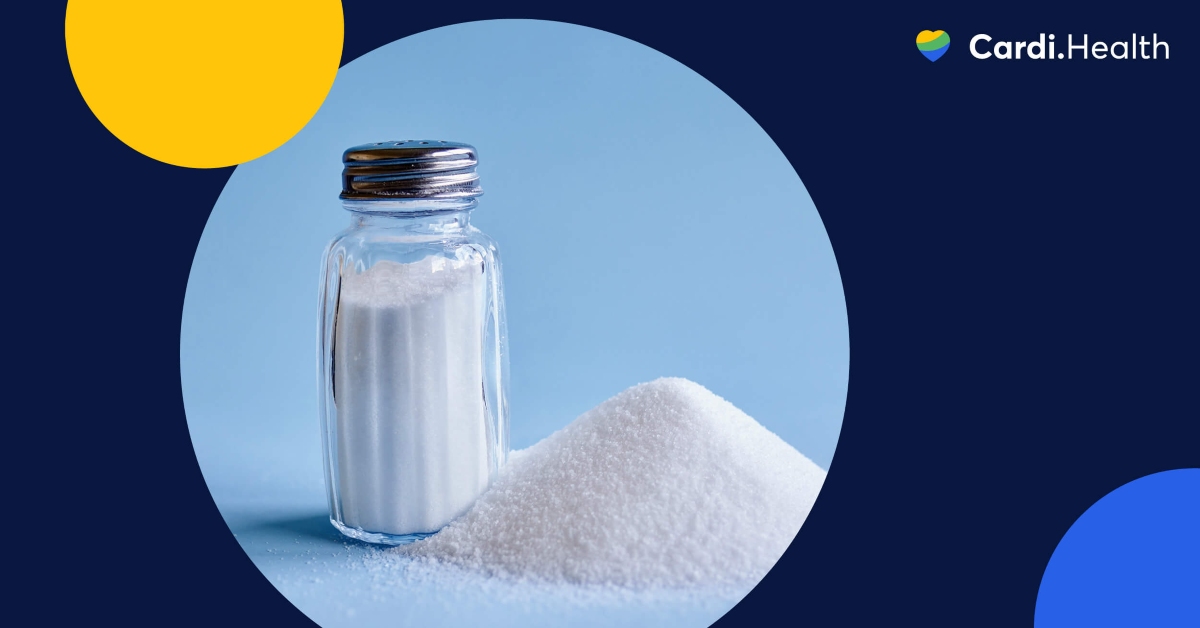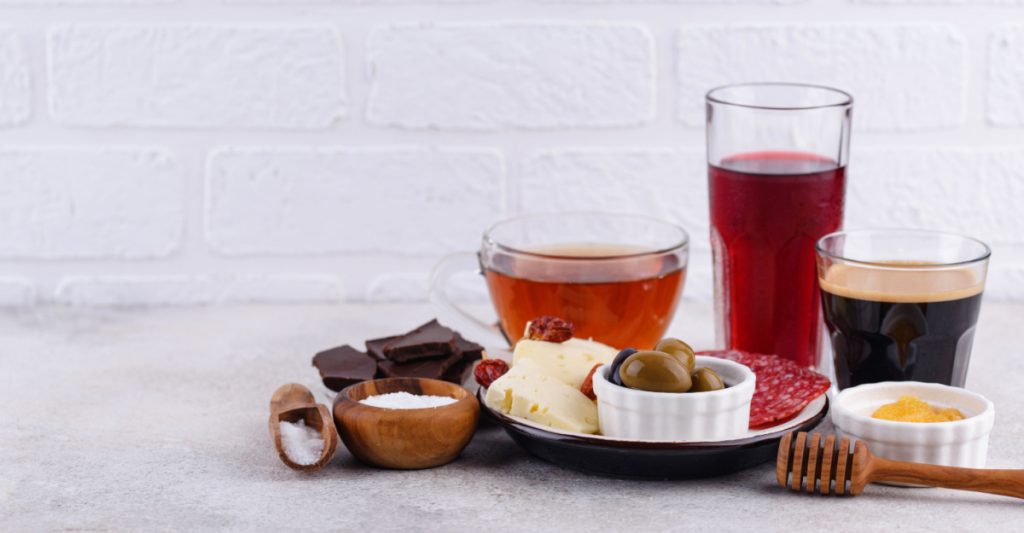8 Foods That Raise Blood Pressure Quickly: A Comprehensive Guide
A study once found that 49% of people experience periods of low blood pressure (hypotension) daily. For people using medication that can lower blood pressure, such as hypertension, there’s a chance that this can happen.
Whether you’re someone treating high blood pressure or not, it is important to try to stay within the normal blood pressure range. Low blood pressure can cause dizziness, fatigue, fainting, and even organ damage when it persists.
There are certain foods that raise blood pressure quickly, so it is a good idea to know about these. This guide will educate you on these, so let’s get into it.

Master your heart health now
Take part in our 60sec quiz and get a heart health plan tailored just for you.
Contents
1. Salty Snacks
Sodium, which the body gets mostly from salt, has long been linked to high blood pressure. This is why cutting down on salty foods is frequently recommended for people with hypertension.
However, these same salty foods and snacks can be useful if you need to raise low blood pressure quickly. While they won’t elevate your blood pressure immediately, they can start to have an effect in as little as 30 minutes.
If you need to raise your blood pressure quickly, here are some sodium-rich snacks and foods you can try:
- Canned soup
- Cured meats, like sausages, bacon, and ham
- Pickled foods, like cucumbers, eggs, and cabbage
- Smoked or canned fish, like tuna
- Cottage cheese
- Olives
2. Sugary Treats
Sugar has gained the reputation of being something that should be minimal in a healthy diet. It’s popular knowledge that eating foods with too much added sugar can cause weight gain, but it can also raise blood pressure.
You can use this to your advantage when you want to raise blood pressure during episodes of hypotension. Below are some sugary treats that can be very useful in this regard:
- Sugar-sweetened beverages, like soft drinks, energy drinks, and some fruit juices
- Sweet baked goods and pastries like cakes, donuts, and tarts
- Sugary breakfast cereals
- Candy
Start managing your heart health now!
Find out what works for you with this 60sec quiz.

3. Animal and Plant Protein
Without getting into too much detail, proteins are important in the regulation of blood pressure. They are essential in maintaining healthy plasma volume.
Some studies have shown that eating a lot of foods high in protein can acutely increase blood pressure. This is especially true in the case of animal proteins like red meat.
There are several options rich in protein that you can eat to help increase blood pressure quickly. These include:
- Red meat, like beef, lamb, and pork
- Processed meat cuts, like bacon, sausage, ham, and deli meats
- Vegan burgers and sausages
4. Caffeine
It can be found in a lot of common beverages, but does caffeine raise blood pressure?
It has been long-established that consuming caffeine will raise your blood pressure. Although the increase in blood pressure that it causes is not sustained, it is one of the most effective ways to raise blood pressure quickly.
This is why it is recommended that individuals with high blood pressure avoid consuming caffeine-containing beverages. However, its effect on blood pressure can be used to increase blood pressure when it is too low.
This means that caffeine-heavy drinks like energy drinks, coffee, tea, and cola drinks, can raise blood pressure rapidly.

5. Processed and Packaged Foods for Quick Fixes
The dangers of heavily processed foods have been preached for ages. They can contribute to weight gain, adversely impact heart health, and cause increases in blood sugar.
While you should avoid foods like these on a regular day, they can be useful when you need to increase blood pressure quickly.
Once processed and canned or packaged, these become foods high in sodium, trans fats, added sugars, and so on. This makes them good choices if you want to raise your blood pressure fast.
Some examples include:
- Canned soups
- Many other canned foods, like canned beans
- Processed and deli meats
- Condiments like ketchup, soy sauce, and salad dressings
- Snacks like potato chips, crackers, and cookies
However, consistently eating these kinds of foods has been linked to hypertension. It is important to avoid foods like this for regular consumption.
6. Fruits and Vegetables
Fruits and vegetables can help with blood pressure control, particularly when they are rich in potassium. It has been established that a high level of potassium lowers blood pressure in hypertension.
However, while potassium lowers blood pressure, it has also been shown that having too little potassium in the body can lead to low blood pressure. Eating fruits and vegetables high in this mineral can help raise blood pressure back to normal levels.
There are many fruits and vegetables that you can eat in a pinch to boost your potassium, and they include:
- Bananas
- Leafy green vegetables, like spinach, kale, broccoli, and bok choy
- Beans
- Nuts
- Avocado
- Dried apricots
- Potatoes
- Watermelon
7. Water and Hydration
When dealing with low blood pressure, there’s an easily available yet effective drink you can turn to, and that’s water. It is very important in the body for several reasons, including maintaining normal blood pressure levels.
Blood plasma, which is the fluid that your blood cells are suspended in, is made up of mostly water. When you are dehydrated, your blood volume decreases, and this can lead to low blood pressure.
Drinking enough water daily can help keep a suitable volume running through your blood vessels and prevent episodes of low blood pressure.
How much water is sufficient depends on you, though. Do you exercise frequently? Do you sweat often? How old are you? There are many questions that need to be asked, but on average, men need about 16 cups a day, and women 12 cups.
Keep in mind that other drinks can be useful for hydration besides water. For instance, milk, sports drinks, and coconut water can be great options.

8. Healthy Fats
Fat, as a macronutrient, has the reputation of being something to minimize in your diet. This is because it is seen to have a negative impact on heart health and weight. However, this mostly refers to saturated fat.
Unsaturated fats, also called healthy fats, can reduce heart disease risk and have many benefits for the cardiovascular system as a whole.
Regular fats can raise your blood pressure, but they can harm your circulatory system. Instead, you can opt for foods high in healthy fats that can have a similar effect:
- Fatty fish, like salmon, tuna, mackerel, and sardines
- Full-fat dairy products
- Avocados
- Nuts and seeds, like cashews, almonds, and sunflower seeds
Understanding Low Blood Pressure and Its Implications
Low blood pressure, or hypotension, typically refers to a blood pressure reading under 90/60mmHg. As someone with hypertension, the further your blood pressure reading is from hypertensive limits, the better, but at the same time, it’s not ideal for it to be too low.
Hypotension can be simplified as slow blood flow, and when severe enough, the blood barely has enough pressure (or speed) to climb up to the head and brain, which can cause symptoms.
For most, the biggest danger of hypotension is fainting, especially as it can lead to further injury. Besides having your blood pressure checked, you can tell when you’re having a hypotensive episode with the following symptoms:
- Dizziness
- Fatigue
- Confusion
- Nausea
- Headache
- Blurred vision
- Feeling your heart beating fast or hard
If you notice any of these symptoms, especially with a blood pressure measurement lower than usual, you should visit your healthcare provider as soon as possible.

The Role of Diet in Raising Blood Pressure
You should understand that your diet plays a big role in your blood pressure levels. The macronutrients and micronutrients found in our food can help fix hypotension, but they can also worsen hypertension.
This is why it is important to make the right lifestyle changes, such as a heart-healthy diet, to tackle hypertension. Watch how much salt you consume, or start a low sodium diet; reduce your intake of fats by avoiding fried foods, eating only lean cuts of meat, or going for low-fat dairy products; drink more fluids; reduce added sugar intake.
Admittedly, it can be hard to be consistent with your dietary choices, but an app like Cardi Health can provide you with a personalized meal plan that will take into account your medication and blood pressure measurements.
Start managing your heart health now!
Find out what works for you with this 60sec quiz.

FAQ
What foods can quickly raise blood pressure during episodes of hypotension?
Salty snacks, sugary treats, protein-rich foods, caffeine-heavy beverages, processed and packaged foods, certain fruits and vegetables, water and hydrating drinks, and foods high in healthy fats can all aid in quickly raising blood pressure.
How can caffeine impact blood pressure?
Consuming caffeine can lead to a temporary increase in blood pressure, making it useful for quickly elevating blood pressure during low episodes.
Why is water important for blood pressure maintenance?
Water plays a crucial role in maintaining blood plasma volume. Dehydration can reduce blood volume, leading to drops in blood pressure. Consuming adequate water can help prevent episodes of low blood pressure.
Are all fats bad for blood pressure?
No, unsaturated fats, or healthy fats, can benefit the cardiovascular system. While regular fats can increase blood pressure, it’s advisable to opt for foods with healthy fats for a safer effect on the circulatory system.
Foods That Raise Blood Pressure Quickly: Key Takeaways
During episodes of low blood pressure, there are several foods that raise blood pressure quickly. For instance, foods with a lot of salt, added sugar, potassium, fat, and protein can help. You can also benefit from caffeine and increased fluid intake.
However, for the best advice, it is a good idea to contact your healthcare provider. They can provide personalized information that will bring about the best outcome.
Regardless, always strive to make the right choices with the food you eat to keep your blood pressure well-controlled and to keep yourself healthy.
Related articles
Best Foods to Lower Cholesterol
Does Caffeine Raise Blood Pressure?
Does Drinking Water Lower Blood Pressure?
Causes of High Blood Pressure at Night
10 DASH Diet Breakfasts for a Healthy Start
Heart-Healthy Diet Guide
What Should an 85-Year-Old Blood Pressure Be?
What is Normal Blood Pressure for a 70-Year-Old?
How to Read Blood Pressure: A Comprehensive Guide
Manage your heart health now
Find out what works best for you with this 60sec quiz and get your personalized heart health plan.

